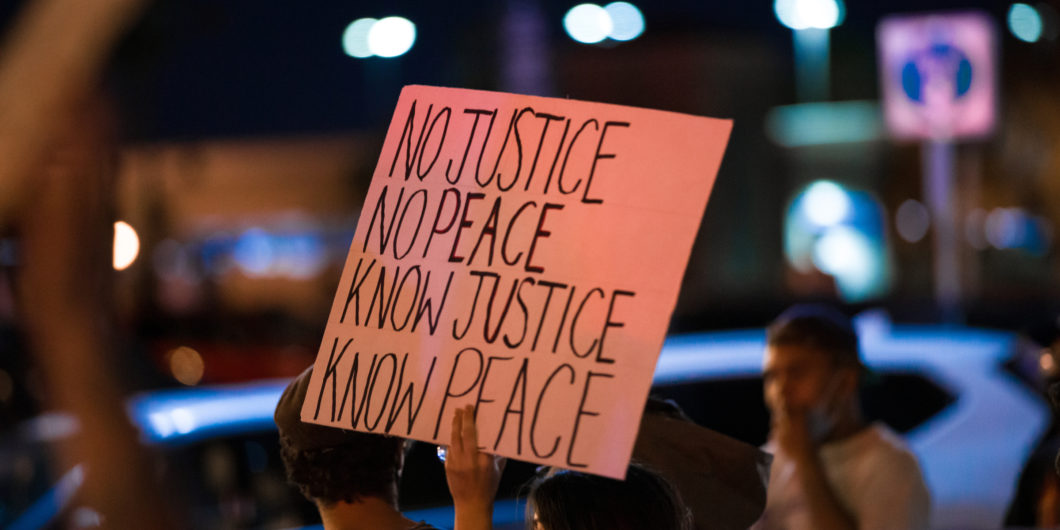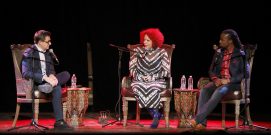Like a frog in the proverbial pot of boiling water, we are now immersed in the suddenly-ubiquitous delusion of wokeness.
Diagnosing the Woke
Editor’s Note: This essay is part of a Law & Liberty symposium on Joshua Mitchell’s American Awakening.
It is good to see Joshua Mitchell initiating a serious conversation about the pathologies of the “woke” left. Conservatives discuss this subject often, but rarely with the diagnostic focus that Joshua Mitchell applies to the subject. It’s a worthwhile project. Diagnosis is needed if we hope to respond appropriately to present circumstances.
A few other social critics, such as Mary Eberstadt, have written books on identity politics, but few have dialed in on the subject with the intensity Mitchell shows in American Awakening. To make sense of his theory, one must start by understanding that “Identity Politics,” for Mitchell, is not just a plebeian political strategy, or a broad-based sociological trend. It is a multi-faceted phenomenon integrating the religious, moral, political, and psychological forces that he sees shaping today’s elites. He isn’t just diagnosing the excesses of diversity committees. “Identity politics,” as he understands it, is directing the course of Western Civilization itself.
That’s very bad news. Looking at the insane excesses of the activist left, Mitchell sees a post-Christian moral sensibility fusing in insidious ways with cosmopolitan snobbery, entrenched statism, and neo-liberal arrogance, ultimately giving rise to a kind of cultural psychosis. From Christianity, he believes, our elites have inherited a high sensitivity to guilt and innocence, and especially to the immense moral authority that innocence can command. Mitchell writes of an “invisible economy” of guilt and innocence, which is superimposed on the “visible economy” where people pursue this-worldly goals in practical ways. In effect, identity politics is an unholy hybrid of a Christian moral framework (which demands ultimately that the righteous be rewarded, the wicked punished, and innocent victims avenged) and a naturalistic moral framework that acknowledges this-worldly settlements as the only ones that count.
The Instability of Social Justice
Social justice warriors, in this view, are unstable precisely because they have an unstable mix of moral commitments. We are not to rest until justice has been achieved across our entire society, but in a fallen world this is simply not possible, especially once we expand the scope of our concern to include historic wrongs like slavery. How could living Americans possibly atone for the egregious wrongs our forebears committed when they kidnapped Africans, chained them like desperate criminals in slave ships, and then sold them like livestock at auction? The answer is simple: we can’t. Only God can right these wrongs. For adherents of identity politics, however, there is still a strongly-felt need for cosmic balancing. They channel that angst back into the visible economy, by smashing statues of slave owners, defunding police forces, demanding reparations, defending arsonists, and denouncing everything from nutrition science to Dr. Seuss as racist. Because the cosmic scales are never balanced, activists become increasingly radical in their efforts to square the circle. Some groups are cast as scapegoats who can do nothing right, while victim groups are absolved of all moral responsibility, regardless of their personal choices.
In part, this is what happens when a post-Christian society wrestles with the ghosts of its Christian past. There is also an element of neo-liberal impatience. In the later 20th century, elites became convinced that history in the old sense had ended, precipitating a kind of societal Judgement Day. All legitimate grievances needed to be addressed right now. We cannot settle for an imperfect modus vivendi, or wait for incremental change.
Cosmopolitanism adds both cultural and moral components to this picture, because elites today have generally been initiated into a kind of technocratic aristocracy. Our wealthiest and most credentialed citizens are often quite comfortable with the technocratic elites of other nations, and less so with their own more-provincial compatriots. These cultural affinities affect elite morals and manners alike, leading influential leftists to see internationalism as the answer to a range of global problems (environmental degradation, human migration, global health crises, terrorism), without noticing the social and moral costs. Finally, statist bureaucracy gives our godless technocrats the mechanism they need to remake the world in their image. Like landless aristocrats, they claim offices and institutions as their patrimony, and busy themselves trying to build the transnational utopia that they see as the solution to most problems.
The Benefits of Hostile Criticism
This is definitely “hostile” social criticism, in the sense that Mitchell really makes no effort to sympathize with the progressive left, or to describe them in terms they would recognize or acknowledge as fair. He casts himself in the position of “social psychologist,” discoursing on each analysand (mostly progressive elites, though he occasionally turns his attention to other groups such as the alternative right) with the obvious assumption that he understands them better than they do themselves. Obviously, this book is pitched for intra-conservative discussion, not bipartisan outreach. With that understanding, there are pros and cons to this approach.
The major benefit of hostile social criticism is that it allows for frank discussion of genuinely pathological aspects of our political order. Politics always raises a multitude of prudential questions, on which reasonable people can disagree, but there are also unreasonable elements that merit some attention. In the interests of getting at the truth, it can be appropriate to stop taking fellow citizens seriously, so that we can put them on the couch and figure out what ails them.
Not surprisingly, Mitchell’s hostile diagnosis of the left overlaps significantly with the work of other right-leaning social critics who are engaged in a similar project. For instance, in casting identity politics as a post-Christian (and especially post-Protestant) quasi-faith, he is entering similar territory to what Joseph Bottum explored in An Anxious Age. R.R. Reno has written extensively on neo-liberalism, and how the end-of-history assumptions of the later 20th century have distorted modern politics. It’s basically a commonplace on the right at present to denounce influential elites as alienated, out-of-touch technocrats with utopian transnational aims. All of these touch points are helpful for orienting a reader of American Awakening.
Mitchell’s theory does more than these others, however, to explain why social justice activists display such an egregious lack of historical or (ironically) global perspective. This is really one of the more puzzling features of today’s progressive left. Even if one is willing to go a certain distance with the activists in agreeing (say) that historical injustices have a meaningful causal relationship to contemporary inequalities, progressive thinking on these topics still seems bizarrely unbalanced. It should be obvious that human history is full of sin and injustice, such that all of us can look on our traditions and heritage with a complex blend of pride and shame. If one believes in sin, forgiveness, and the possibility of redemption (all robustly Judeo-Christian ideas), it is possible to feel some pride in one’s heritage without downplaying the seriousness of ancestral sins. The social justice activists seem to have no appreciation for this nuance. They actually seem to believe that Americans, or whites, or men, are uniquely and irredeemably guilty, for reasons written into the whole fabric of our society. Mitchell’s theory addresses this particular pathology rather well. The progressive narrative really doesn’t have room for nuance, because leftists need to see something like the Christian story of fallenness and redemption, being played out in the temporal sphere. They don’t believe in Lucifer, so white men have to stand as a substitute.
Meditating on the religious nature of identity politics may also give us perspective on another puzzling feature of wokism: its insistence on treating relatively low-level injustices as civilization-threatening existential crises. This is truly a frustrating trend, for those of us who still make good-faith efforts to engage our left-leaning friends in fruitful dialogue. Racism may not be dead, but surely we should all agree that campus “microaggressions” or insensitive political memes are far less bad than the injustices suffered by black Americans prior to (or in the immediate aftermath of) the Civil War. Astonishingly, some people strenuously resist this claim. Mitchell’s theory again offers some potential insight here. We cannot really understand the progressive perspective until we appreciate the metaphysical and spiritual significance that the relevant events hold for activists.
Hostile social criticism can be helpful when politics takes a pathological turn. Somewhat ironically though, Mitchell himself has shortcomings that are oddly reminiscent of the progressive left’s: He treats the pathologies he’s describing as an existential threat to all of civilization, without offering needed historical and global perspective. Throughout the book, Mitchell seems to take for granted that the trends he describes pose a unique and serious threat to American society. Until recently, he suggests, most people didn’t attach “moral freight” to their various identifiers; they were men or women, Catholics or Protestants, Frenchmen or Algerians, and “nothing more need be said.” He seems to think, too, that Americans in days of yore had a talent for the kind of functional citizenship which addressed problems on the ground, through cooperation and prudential reasoning. “Identity politics” in Mitchell’s presentation is a radically new phenomenon.
The Novelty of Wokeness
This is much harder to buy. Narratives of guilt and innocence have been a driving force in politics from ancient times. This is why Aristotle was forced to flee Athens at the end of his life, and why Carthage had to be destroyed. There has never been a time when people didn’t attach some “moral freight” to group identifiers, which is why Christians were thrown to lions, and why Armenians were massacred by the Turks in 1915. In modern times, post-Christian non-believers have tried again and again to “immanentize the eschaton,” blending Christian and non-Christian commitments in ways that trend towards radicalism. We see this in the French Revolution. We see similar patterns at work across the entire history of socialism. Modern people are constantly wrestling with the conscience that Christianity forced them to grow. Today’s woke warriors may be radical, but are they really radically new?
It is especially strange that Mitchell so briefly discusses the work of René Girard, whose thoughts on collective guilt and scapegoating have strong similarities to his own. Twentieth-century thinkers like Hannah Arendt or George Steiner struggled at great length to understand why a developed nation like Germany became so desperate to shed painful historical baggage, that it committed heinous atrocities against the Jews. These texts seem extremely germane to Mitchell’s subject; the parallels to contemporary circumstances are strong. This may or may not be comforting, depending on what lessons we ultimately draw from historical precedents. It’s really quite important to examine those precedents, however, if we want solid perspective on what is happening in America today.
Ultimately, to get a full perspective on our present political situation, we may also need to balance “hostile” analyses like Mitchell’s, with the work of more-sympathetic social critics such as Yuval Levin, Ross Douthat, or Arthur Brooks. We won’t have much chance of regaining the functional citizenship that Mitchell wants, unless we can find some way to leven the politics of pathology with a more prudential effort to meet our compatriots where they are. Mitchell has a “pathologizing” explanation for every leftist argument or trend, but that can be a weakness more than strength. If (as I suggest) the “pathogen” of identity politics is basically endemic to all modern politics, then available “antibodies” may also be more robust than he supposes. Identity politics is not the only force at work in our society. Mitchell has done conservatives a service by offering genuinely helpful insights into the pathologies of wokism. The next step is to use those insights in a good faith effort to engage our compatriots as citizens.


